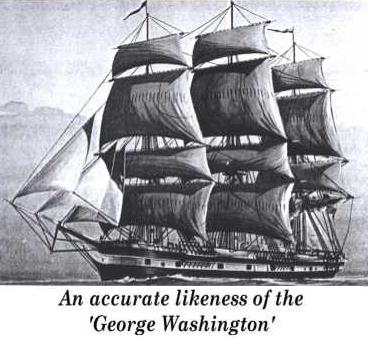The GEORGE WASHINGTON,built 1822 in New York,This splendid ship, formerly an American 3 mast liner, was owned by the "Nord Deutscher" Shipping Line. She rated at 462 tons and was skippered by Captain Matthew Probst and a crew of 20. In 1844 the voyage, under consignment to H.C. Stackman with three cabin and 184 steerage passengers, and carried assorted goods for the S.A. Company and three rams for Anthony Forster, a prominent Adelaide citizen and agent for G.F. Angas. departed Hamburg (May 23rd) and Bremen (May 27-29th). The voyage was accomplished in great harmony and the passengers arrived at Port Misery September 11th, and berthed on the morning of September 12th 1844. 1844 GEORGE WASHINGTON - PASSENGER LIST Departed October 8th, 1844 to Batavia. |  |
|
The SA REGISTER (dated September 14, 1844) reported: “Arrival of George Washington, 461 tons; Probst master. Passengers: M. L. Mundal, H. H. Behr, E. F. C. Hargen in the cabin, and 184 passengers, consisting of 52 adult males, 40 females, 45 boys and 50 girls. We understand the passengers present are a very clean and respectable appearance; one of them became deranged at an early stage of the passage and, we are sorry to say, he still continues in that melancholy state. The vessel not having put in at Plymouth, as expected, brings only a few English letters transmitted to the S. A. Company agents in Germany a few days before she left…” There were misgivings and misapprehensions in Europe about the eligibility of South Australia as an emigration field. Captain Probst visited many of the Lutheran settlements in order to see for himself whether South Australia offered favourable opportunities to immigrants from Germany. Dr. Brauer quotes the Observer of October 5, 1844, which records the Captain’s impressions: “In the course of his inland journeys, Captain Probst visited many of the German settlers, and especially those at Hahndorf, with whose appearance, condition, increasing comfort and evident prosperity he was so much gratified as to express an ardent wish that he could bear away with him some written testimonies corroborative of his own favourable views (himself an old traveller) of the eligibility of South Australia as a field for German emigrants. With these he was plentifully furnished by some of the English and German settlers, and upon being informed of the Captain’s desire, the Rev. A. Kavel, Pastor of the Lutheran Church at Hahndorf – and himself a settler of nearly six years standing – cheerfully undertook to pen a circumstantial narrative and statement for the Captain’s use and for publication in Germany on his arrival. The compilation is a faithful and interesting one; and as the important facts comprised in it are calculated to afford unmixed pleasure and mutual advantage in many other quarters, Mr. Kavel has consented to allow a translation to appear in these columns. Captain Probst is also furnished with collections of geological, zoological, and mineral specimens for presentation to one of the Continental Societies, as also with samples of colonial produce and manufacture. Among the later is some cordage made in Bethany from flax grown by one of the German settlers in that beautiful vicinity.” |
|
The group of emigrants from the District of Sorau were described as Old-Lutheran, and at one hearing they declared that they were emigrating because of restrictions to their religious life and because they felt called to work for the spreading of the evangelical Lutheran religion in distant continent. However, because they were required to take a pastor with them, and they could not produce one, they stated that the teacher Kathner from Schoin who was going along with them would conduct their religious services on the ship. They threatened to emigate without approval as they had already sold their property and paid for part of the voyage. Finally they emphasised that they were emigrating not only because of their faith, but also to seek prosperity in their earthly lives. As a result dismissal documents were issued on April 20th, 1844 to the Hensel, Irrgage, Lindner, Schneider, Schrapel, Stiller and Walter families. The most important of the emigration agencies was the firm of Eduard Delius of Bremen, which from the mid 1840s worked hard for emigration to South Australia, and charted and dispatched many ships there. As a result, from the mid 1840s Bremen stood next to Hamburg as the port of departure from our Lutheran emigrants.
|
